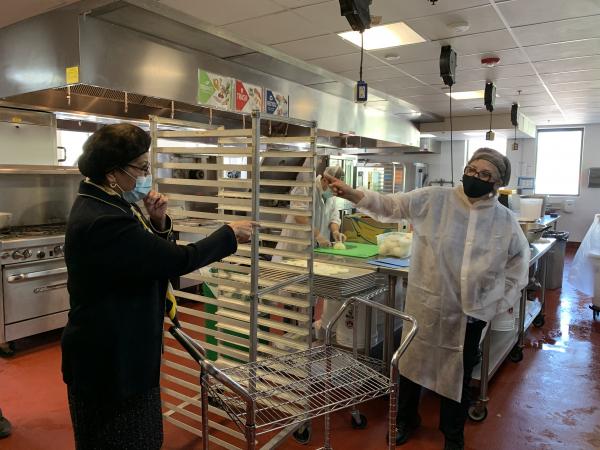October 13, 2020

SBA Administrator Jovita Carranza visited Dorchester's CommonWealth Kitchen, a Quincy Street incubator where Jen Faigel, executive director (right), explained their business model. Katie Trojano photo
The head of the US Small Business Administration (SBA) visited Boston last week to meet with some of the people who received loans from the Paycheck Protection Program (PPP), which pumped more than $14 billion into 110,000 businesses in the city of Boston.
One of the stops made by SBA Administrator Jovita Carranza, was CommonWealth Kitchen, a non-profit on Quincy Street in Dorchester that uses shared kitchen space and functions as a launchpad to assist aspiring chefs and food industry entrepreneurs – the majority of whom are women and immigrants of color.
Jen Faigel, executive director of CommonWealth Kitchen, told Carranza that the PPP loan “honestly saved our operation and provided us with really important funding because we rely on revenue from our businesses to cover our costs. It also allowed us to waive fees for all of those businesses, and so we didn’t have to put them into further debt so that we could pay our own bills. That has helped us create a better situation for them and our recovery strategy.”
Before March, Commonwealth Kitchen housed 55 businesses, 75 percent of which were owned by women and/or people of color, and a third of which were started by immigrants. Now, according to Faigel, about a third have been able to resume operations.
The PPP program, established by the CARES Act and distributed through partnerships with local banks, helps small businesses cover payroll and other costs while facing pandemic-related impacts.
“In Massachusetts, we have over 700,000 small businesses that represent a little over a million employees,” said Carranza.
And in Boston there were over 111,000 businesses that were supported by the PPP program. That’s a funding of over $14 billion.
“What has been important for me as an administrator, advocate, and supporter of the cabinet during this tremendous pandemic is going out and sharing with the small business owners, learning how the Paycheck Protection Program has enabled them and their employees, and thinking about what more we can do at the SBA to support small businesses and employees going forward.”
When asked if her agency anticipated a second round of PPP loans, Carranza said: “Yes, just as soon as Congress and the Senate come up with an agreement. They're still negotiating today. Everyone is anticipating, including the president, to get something resolved before the campaign [ends]. If that’s achieved, that money will be made readily available by the banks in order for us to approve the loan transactions.”
A second round of funding would be available both to those who need to apply again and for those owners who didn’t apply in the first round, said Bill Manger, chief of staff at the SBA, who accompanied Carranza on her visit to Boston.
“We have to see what the final [bill] says, but we believe that it will include additional new applicants,” Manger said.
That’s important to Faigel at CommonWealth Kitchen, who said that many of the start-up food businesses she helps did not seek a loan in the first round.
“We understand the power of the model, and we’ve been going out and sourcing businesses, particularly in immigrant communities and communities of colors, that might now trust the banks or are scared of getting into more debt,” she said. “We certainly know of many entrepreneurs that didn’t apply because they were worried about debt.”
Carranza said that many of the banks that the SBA partnered with to disburse relief funding used their own assets. “And that’s surprising for some of the small businesses to learn. We didn’t just pour a ton of money into the banks and say, ‘Distribute their checks.’ They took the shareholders' value of the assets and said, ‘We’ll take care of this, but make us whole on the back end’ and that’s what we’re working on with the forgivable application. That’s been streamlined and is probably going to go through another reiteration.”
Kerry Harrison, vice president of public affairs for Citizens Bank, said that 85 percent of PPP loans distributed by Citizens were for less than $150,000.
“We appreciate the partnership with the banks so much because that was the way that the program was structured. We would on a delegated basis have the banks make these loans, and so it was an amazing public-private partnership,” said Manger. “We were given the task by Congress…and we basically had six days to stand up a whole new program. It was quite a daunting task, especially now that we’ve been able to get out $525 billion. To be able to craft a program that could do that in the short amount of time that we did I think is actually pretty miraculous.”
Carranza thanked Faigel for her work assisting other small business owners through CommonWealth Kitchen.
“The fact that you have employees here trying to model a good business plan for a potential client of yours, that’s typically what the SBA does for any entrepreneur that approaches our office,” she said. “At the end of the day people are watching how you are handling this pandemic, and so you serve as a role model, and inspiration – even to the ones who know they’re going to have to throw in the towel.”
“Our work is fundamentally about economic development by using the food industry as a way to help people build assets and wealth,” said Faigel, adding that PPP loans will allow small businesses to “rehire, have a little bit of hope, and start to innovate.”


